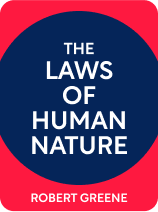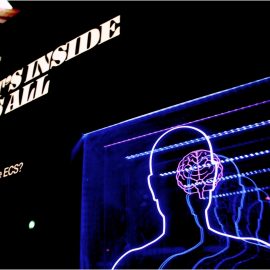

This article is an excerpt from the Shortform book guide to "The Laws Of Human Nature" by Robert Greene. Shortform has the world's best summaries and analyses of books you should be reading.
Like this article? Sign up for a free trial here .
How do you know your purpose? Why do people need a purpose to feel satisfied?
It’s difficult to know your purpose. But once you find your purpose, you can follow these strategies to pursue it, and hopefully, live a more fulfilled life.
Keep reading for strategies on how to know your purpose and pursue it.
Know Your Purpose
It can be hard to know your purpose. But finding and pursuing your purpose is worth it. Without a purpose, you’ll find yourself much more prone to develop toxic traits.
Finding Your Purpose in Life
Most people’s purposes don’t come to them naturally. While a few people might successfully identify them in childhood or have a eureka moment later in life, most people have to spend a fair amount of time reflecting to discover them.
There are four strategies for finding your purpose in life. The goal of all of them is to look beyond the influences of the people you know and society to find out what you uniquely are interested in so you can know your purpose.
Strategy #1: Identify your brain’s favorite type of intelligence. According to psychologist Howard Gardner, everyone’s brain has an affinity for a different type of intelligence, such as intelligence in math, music, or physical activity. When you’re doing one of these activities and it feels natural, that’s your intelligence type.
Strategy #2: Listen to your body. When you stray from your purpose or take a wrong turn, you’ll feel uncomfortable. The path is broad and there’s room for exploring, but it’s always headed in the same general direction. (The path can also include many facets—for example, some people find their purpose in combining fields of study. Leonardo da Vinci mastered both art and science.)
Strategy #3: Identify your natural abilities. Reflect on what activities feel easy and natural for you and what activities you’re happy to practice for long periods. You also probably won’t be overly bothered by criticism when doing these activities.
Strategy #4: Identify your primal inclinations, which are things you’re attracted to. Think back to what interested and fascinated you when you were a child. You probably won’t know why you were drawn to this activity (if you were pushed towards something by your parents, then it’s not primal). Often, you’ll have been drawn to something after watching someone else do it.
- For example, when chemist Marie Curie was four, she walked into her father’s office, saw lab equipment, and felt drawn to it. You may experience something similar when you know your purpose.
If you’re just starting your career, explore your inclinations widely. For example, if you’re called to science, try biology, chemistry, physics, and so on. If you have experience already, don’t make a drastic career change. Instead, find a way to direct the skills you already have towards your purpose.
Pursuing Your Purpose
Once you’ve worked on finding your purpose in life, you can use the following strategies to pursue it:
Strategy #1: Transform pain and negativity into motivators. To be successful in pursuing your purpose, you need skills, but skill acquisition can be painful because it requires many hours of practice, honest assessment of your abilities, criticism, and overcoming obstacles.
- For example, Thomas Edison didn’t like being ridiculed, so to encourage fast skill development, he’d talk to journalists about his upcoming inventions to give himself a deadline—if his invention didn’t come out shortly after being announced, he’d be mocked.
Strategy #2: Spend time with purposeful people and avoid purposeless ones. Because humans mirror the emotions of others, physically surround yourself with people who know their purpose so that their drive will wear off on you. These people are easy to recognize: The young ones seem fated for success, and the older ones have a resume of accomplishments. Additionally, purposeful people might be able to offer advice.
Strategy #3: Break projects into smaller steps. A purpose is by nature a long-term, overarching goal, but it can seem so large and far away that it’s overwhelming and anxiety-inducing. Create smaller, shorter goals that work towards the overall goal to avoid being overwhelmed. Think about the overall goal every once in a while to recalibrate your path and inspire you.
Strategy #4: Create peak experiences to know your purpose which are experiences during which you transcend the everyday and become aware that you have greater potential than you realize. To do this:
- Eliminate distractions. It’s hard to have a peak experience when you’re interrupted, so create lots of time in which to think.
- Create ideal conditions. Start projects and develop skills so that your mind will be open to ideas.
- Focus on your work itself, not the reward associated with it. If you’re thinking about the fame you’ll attract from your work, you’ll never be able to connect to the work itself.
For example, to create peak experiences, when actor Ingrid Bergman got a new role, she’d obsess over it. She didn’t think about how much money was making. Instead, she spoke to the crew about the writing and dialogue, isolated herself so she could connect with the role and forget about everything else in her life.
Avoiding False Purposes
These days, finding purpose is harder than it used to be. In the past, people didn’t have so many choices—there weren’t that many jobs and roles. If they didn’t know what direction to take, there were mentors and advisors who could help.
Today, however, the amount of choices is overwhelming. A lot of traditional support systems, such as religion or, are disappearing and as a result, guidance on behavior, such as conventions or taboos, is also disappearing. As a result, some people:
- Don’t find their purpose. There are plenty of things that can get in the way of finding purpose: others encouraging us to do other things or criticizing our choices, frustration with work, anxiety, or burnout. This failure to find purpose often happens in two ways:
- Embracing the freedom of choice. People with this attitude try a variety of things, don’t make commitments, and don’t take advice from authority. As a result, they never become experts at anything and don’t learn to focus or compromise.
- Creating stability. People with this attitude quickly choose a career that’s practical and relationships that are safe. After years of this, people tend to feel bored by their existing situation and want to start embracing the freedom of choice in midlife.
- Pursue a false purpose. False purposes are external purposes that don’t help us find our place in the world. They’re easier to achieve than real purposes but ultimately lead downward. For example, joining a cult is a false purpose.
If we can avoid the most common false purposes, we’ll be steered toward real purposes instead. Here are the common ones:
False purpose #1: Finding pleasure. When we choose some form of pleasure as our purpose (eating, videogames, and so on), it won’t ultimately satisfy us. We experience diminishing returns and can become addicted.
False purpose #2: Microcauses and groups. These movements and cults typically don’t have any concrete strategies to reach their goals, which are vague and tend to revolve around venting and getting rid of something rather than achieving something. For example, a group might want to get rid of a different group they envy or hate.
False purpose #3: Income and status. Often, the desire for income or status is related to wanting to feel superior. Superiority isn’t a concrete benchmark, so no matter how successful we are, we’re never satisfied and keep searching, which can make us depressed. (The best way to get lasting income and status is actually to follow your purpose because this will attract success.)
False purpose #4: Fame. Fame, like income and status, is a way of feeling superior to others. Due to the rise in social media, there’s a lot of competition for attention and it’s hard to maintain. (The best way to get lasting success, as with income and status, is to follow your purpose.)
False purpose #5: Skepticism. Skepticism is the feeling that life has no purpose and includes ideas like all politicians are corrupt and no matter what we do, the world is doomed, so we may as well do nothing. Skepticism is a way of hiding fear of failure and is a form of laziness.

———End of Preview———
Like what you just read? Read the rest of the world's best book summary and analysis of Robert Greene's "The Laws Of Human Nature" at Shortform .
Here's what you'll find in our full The Laws Of Human Nature summary :
- Why it's in your nature to self-sabotage
- How you behave differently when you're in a group
- Why you're wired to want the wrong things in life






